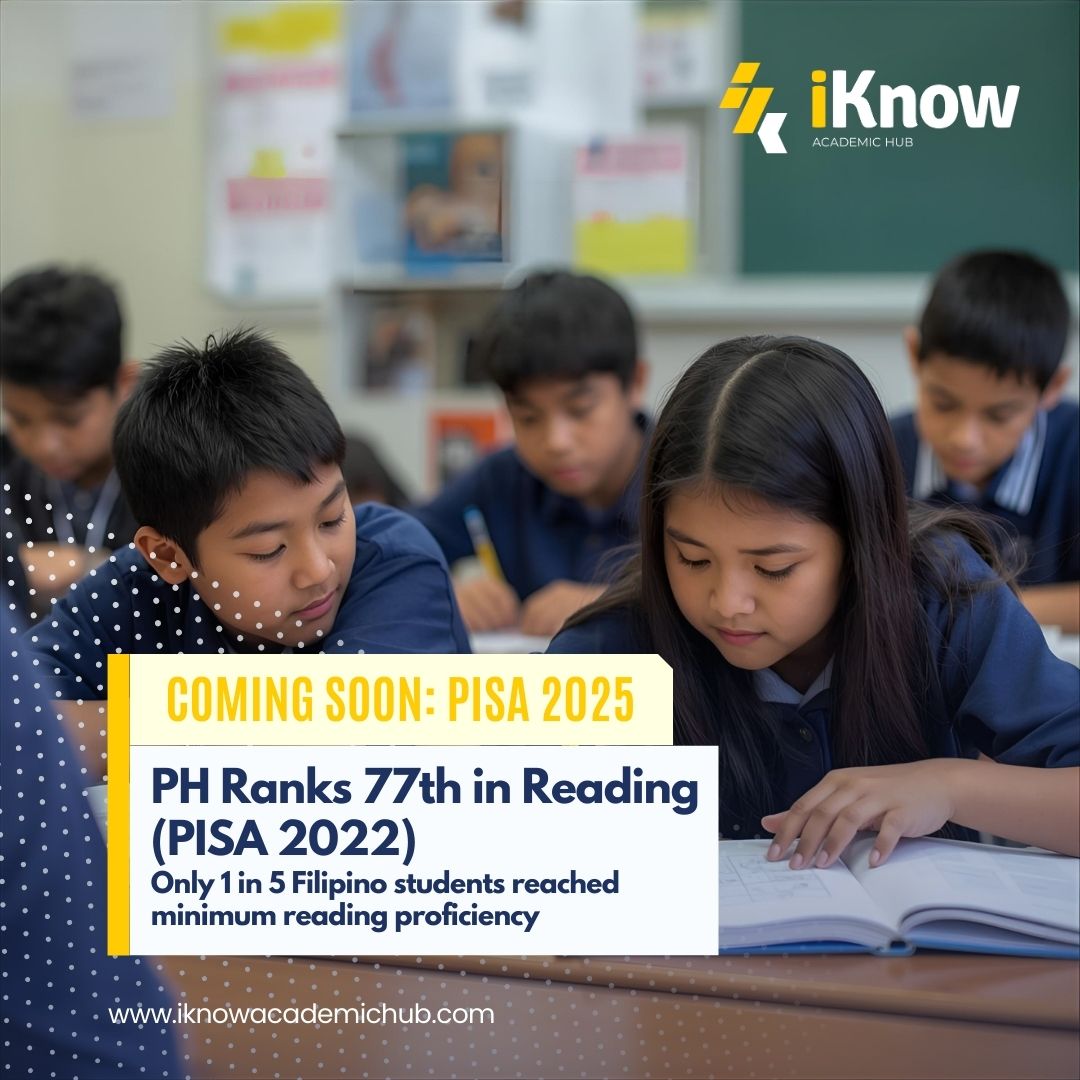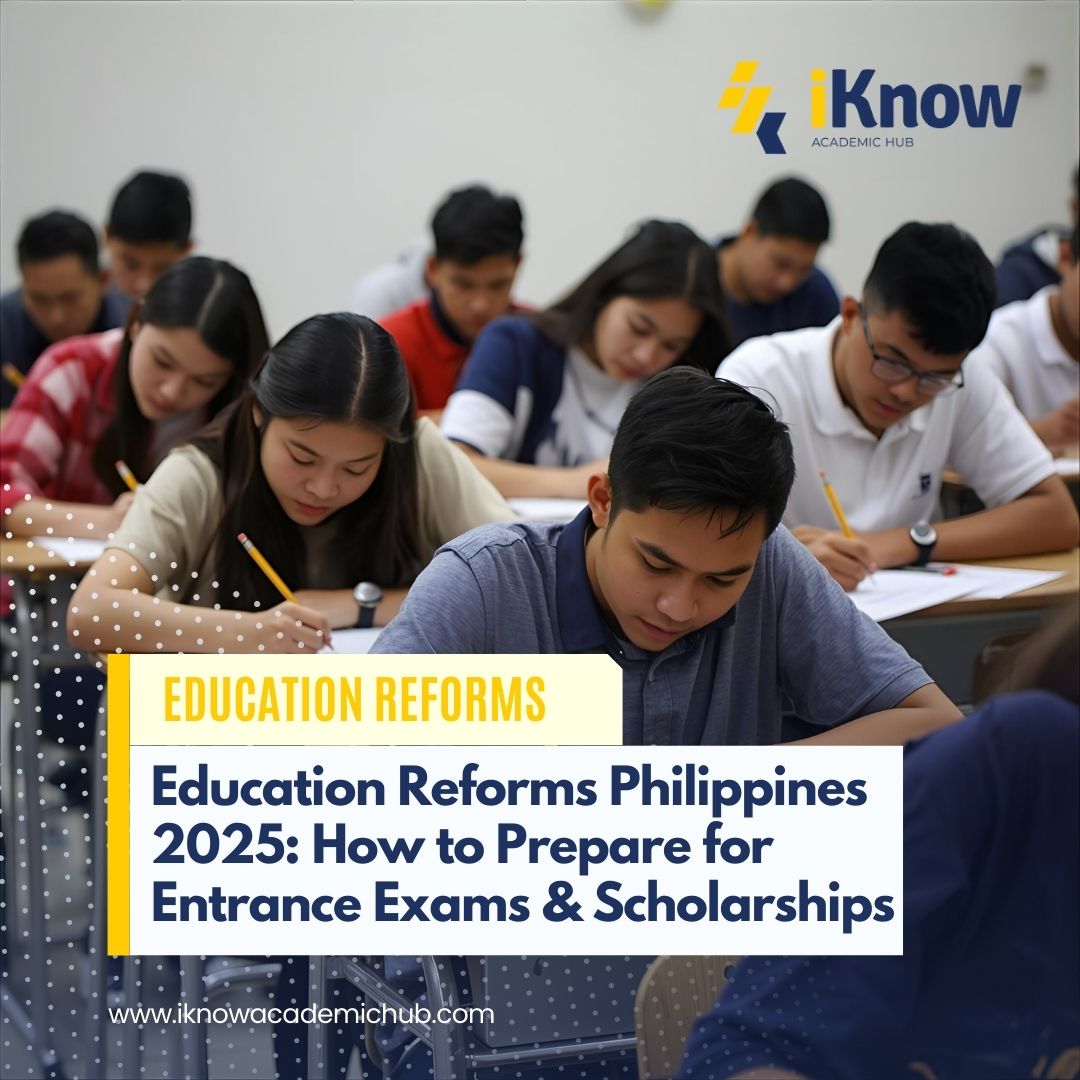Top Universities in the Philippines & Why Students Aspire to Get In
Mon Sep 22 2025

Every Filipino student dreams of joining the top universities Philippines 2025. These institutions shape leaders, drive research, and open doors to global opportunities. From admissions standards to scholarships and alumni networks, the top universities Philippines 2025 set the benchmark for quality learning and career readiness. At iKnow Academic Hub, we help students prepare smarter so they can compete for spots in the top universities Philippines 2025.
List of Top Universities in the Philippines
University of the Philippines (UP)
The country’s national university consistently tops local and global rankings. UP is recognized for its strong research programs and its commitment to public service. According to the QS World University Rankings, UP remains the leading Philippine institution across multiple disciplines[1].
Ateneo de Manila University (AdMU)
Known for its rigorous academics and strong liberal arts foundation, Ateneo produces leaders in business, politics, and the arts. The Times Higher Education (THE) Impact Rankings have recognized Ateneo for its commitment to sustainability and quality education[2].
De La Salle University (DLSU)
DLSU is respected for its research in science, technology, and engineering, alongside strong business and humanities programs. The university has consistently ranked in the QS Asia University Rankings[3].
University of Santo Tomas (UST)
Founded in 1611, UST is Asia’s oldest existing university. It is renowned for its health sciences programs, including medicine and pharmacy, while also excelling in arts and humanities[4].
Polytechnic University of the Philippines (PUP)
PUP stands out for providing quality education that is both accessible and affordable. It has produced graduates excelling in government, business, and media, making it a symbol of academic excellence and inclusivity[5].
Why Students Aspire to Get In
-
Prestige and Reputation – Being part of these institutions brings pride and recognition.
-
Scholarship Opportunities – Many of these schools offer merit- or need-based financial aid.
-
Alumni Networks – Graduates benefit from strong professional connections.
-
Career Readiness – Employers recognize the rigor and quality of training from these top universities.
How to Get There: The Challenge of Entrance Exams
Gaining admission is no easy task. Exams like UPCAT, ACET, DCAT, and USTET are designed to test not just academic knowledge, but also critical thinking and time management skills. The competition is tough, with thousands of applicants vying for limited slots every year.
That’s why focused preparation is key. At iKnow Academic Hub, we offer a Comprehensive UPCAT Review Program tailored to equip students with the tools and confidence to succeed. Our package includes:
-
Intensive subject reviews
-
Online quizzes and mock tests
-
Recorded Zoom lectures for flexible learning
-
Access to exclusive review materials
👉 Enroll now: https://forms.gle/aFgMQJFBzrW8Y9yZA
And if you want to experience our teaching methods first, we also provide a 1-week free trial. This gives you access to review materials, practice tests, and our online platform at no cost.
👉 Free trial registration: https://forms.gle/pU2UVtxfV8QHwQb7A
The top universities in the Philippines 2025 remain the ultimate dream for many students because of the prestige, opportunities, and life-changing experiences they offer. But dreams require preparation. With the right guidance and resources, every student has the potential to pass these exams and secure a spot in their dream school.
At iKnow Academic Hub, we believe smarter preparation builds stronger futures. Start your journey today and take one step closer to becoming part of the country’s top institutions.
Read more blogs
See all blogs
What the Philippines Can Learn from International Proficiency: Reading, Math & Science Benchmarks vs Our Schools
Fri Sep 19 2025The Philippines’ education system continues to struggle when measured against international benchmarks. In the PISA 2022 results, Filipino students ranked 77th out of 81 countries in reading, math, and science — showing a clear gap in Philippines education proficiency international benchmarks1. Meanwhile, the PISA 2025 cycle is already underway, and the Philippines completed its participation in the assessment’s data collection last April 20252. Results are expected to be released in 2026, giving hope that ongoing reforms and interventions will reflect positively in the outcomes. At iKnow Academic Hub, we believe that by learning from international best practices and adapting them locally, Filipino students can build stronger skills to compete not only in entrance exams but also on the global stage. The Global Picture: Why International Benchmarks Matter Top-performing countries such as Singapore, Japan, and South Korea consistently dominate international benchmarks like PISA1. Their strength lies in: Teacher training and continuous professional development Aligned curriculum standards emphasizing problem-solving and critical thinking Early literacy and numeracy interventions to build strong foundations Use of data-driven strategies to improve outcomes These nations demonstrate that systemic commitment to education reform pays off in global rankings, providing valuable insights for improving Philippines education proficiency international benchmarks. The Philippines’ Education Proficiency in International Benchmarks Mean performance in mathematics, reading and science in PISA 2022 Philippines, OECD average and selected comparison countries Source: OECD, PISA 2022 Database, Tables I.B1.2.1, I.B1.2.2 and I.B1.2.3. The Philippines remains near the bottom of the rankings in PISA 20221. Contributing factors include: Learning loss from the pandemic, which worsened existing gaps2 Limited access to teacher upskilling and professional development3 A curriculum that is broad but shallow, making it difficult for students to achieve mastery in reading, math, and science3 These challenges highlight why the country continues to underperform compared to international benchmarks. Lessons from Other Countries What can the Philippines learn from top-performing education systems? Invest in Teachers – Provide continuous training and professional support to raise teaching quality1. Curriculum Focus – Streamline content to emphasize mastery of essential skills over breadth3. Early Literacy & Numeracy Programs – Prioritize reading and math proficiency from the primary years1. Assessment & Accountability – Use regular evaluations to guide policy, instruction, and interventions1. By applying these lessons, the Philippines can gradually close the proficiency gap and improve its education proficiency in international benchmarks. Action Steps for Students & Schools While policy reforms take time, there are immediate actions that can be taken: For Students: Strengthen critical thinking by practicing with structured review materials, timed mock exams, and application-based problem solving. For Parents: Provide encouragement at home and foster habits of reading and independent learning. For Schools: Collaborate with trusted review centers to bridge learning gaps and prepare students for both entrance tests and international benchmarks. At iKnow Academic Hub, we integrate these best practices in our programs. Our Comprehensive UPCAT Review offers updated review materials, expert-led tutorials, and mock exams aligned with the skills tested in both local entrance exams and international benchmarks. You can also experience our approach through a 1-week free trial—giving you access to our teaching methods, review materials, and online platform at no cost. Enroll here: Comprehensive UPCAT Review Enrollment Form Free trial registration: Comprehensive UPCAT Review FREE Trial Conclusion Although the Philippines currently lags in education proficiency based on international benchmarks, there is clear opportunity for growth. With stronger teacher training, a streamlined curriculum, and active student and parent engagement, the country can achieve progress. At iKnow Academic Hub, we are committed to helping Filipino students close the gap in Philippines education proficiency international benchmarks by offering structured reviews and smarter preparation for both local and global challenges. Sources OECD. PISA 2022 Results. https://www.oecd.org/pisa/ Philippine News Agency. Philippines Completes PISA 2025 Data Collection (April 11, 2025). https://www.pna.gov.ph/articles/1247939 Second Congressional Commission on Education (EDCOM II). Philippine Education Report 2023. https://edcom2.gov.ph
Read more
18 Million Graduates: Understanding Functional Illiteracy in the Philippines & What Students Can Do
Mon Sep 15 2025The Philippine Statistics Authority recently revealed a startling fact: over 18 million high school graduates are considered functionally illiterate in the country1. This crisis points to the urgency of addressing functional illiteracy Philippines 2025, where students may be able to read words but struggle to understand or apply their meaning in real-life situations. For learners aiming to pass entrance exams and succeed in higher education, this finding highlights the need for stronger academic preparation and support. At iKnow Academic Hub, we believe that smarter preparation builds stronger futures—and addressing this issue starts now. Why Functional Illiteracy in the Philippines Happens? Functional illiteracy goes beyond not knowing how to read. A functionally illiterate student can recognize words but fails to grasp their meaning in context. For example, they may read a short passage but be unable to answer comprehension questions or apply the information to problem-solving. This challenge directly impacts performance in standardized tests, college entrance exams, and even workplace tasks that require analytical thinking. Why Functional Illiteracy Happens Several factors contribute to the functional illiteracy crisis in the Philippines: Weak foundation in early reading and comprehension Overemphasis on rote memorization instead of understanding Limited access to remedial and support programs Unequal educational resources, especially in public schools Disruptions in learning continuity, especially during the pandemic As UNICEF Philippines has emphasized, the country faces a learning crisis where millions of students fall behind in basic literacy and numeracy skills2. The Impact on College & Careers Functional illiteracy doesn’t just affect reading scores. It has long-term consequences for students: College Entrance Exams: Tests like UPCAT, ACET, DCAT, and USTET are not just about recalling facts but require strong comprehension and reasoning skills. Students with weak foundations struggle to interpret complex questions. Scholarship Opportunities: Many scholarships, including DOST-SEI, require high scores in exams that measure problem-solving and comprehension. Career Readiness: Employers value graduates who can analyze, communicate, and apply knowledge. Functionally illiterate graduates often find it difficult to compete in today’s job market. What Students Can Do The good news is that functional illiteracy can be addressed with consistent effort and the right support. Here’s how students can take charge: Improve Comprehension Skills: Practice reading actively—summarize passages, highlight key ideas, and ask critical questions about what you’ve read. Join Review Centers Focused on Thinking Skills: Instead of relying solely on memorization, choose programs that emphasize comprehension, reasoning, and application. Read Widely: Explore both English and Filipino texts, from news articles to short stories, to strengthen vocabulary and cultural context. Take Advantage of Free Trials: Before committing to long-term programs, students can explore free offerings that demonstrate effective teaching strategies. At iKnow Academic Hub, we design programs that directly target the root of functional illiteracy—poor comprehension and weak application skills. Our Comprehensive UPCAT Review includes notes, quizzes, lecture videos, and mock exams that help students build both knowledge and understanding. One-Year Access: Learn at your own pace with complete coverage of UPCAT subjects. Critical Thinking Emphasis: Move beyond memorization and develop reasoning skills needed for exams and real-life success. Free Trial Week: Experience our teaching methods, review materials, and platform for one week at no cost. 📌 Enroll now: Comprehensive UPCAT Review Enrollment Form📌 Try our 1-week free trial: Free Trial Registration The figure of 18 million functionally illiterate graduates in the Philippines is not just a statistic—it’s a wake-up call1. Students must act early to strengthen comprehension and reasoning skills to succeed in exams, scholarships, and careers. At iKnow Academic Hub, we believe that smarter reviews lead to stronger futures. By addressing functional illiteracy today, students can unlock opportunities for tomorrow. References South China Morning Post. Philippines’ education crisis: 18 million high school graduates are ‘functionally illiterate’, government says. Retrieved from: https://www.scmp.com Philstar. UNICEF warns of learning crisis in the Philippines. Retrieved from: https://www.philstar.com
Read more
How Education Reforms Will Impact College Entrance & Scholarship Opportunities
Mon Sep 15 2025Big changes are coming to Philippine education. With the K–12 curriculum revisions, the DepEd MATATAG agenda, and updates in teacher licensure exams, the country is reshaping how students learn and how schools prepare them for higher education. These education reforms Philippines 2025 aim to close learning gaps, improve employability, and strengthen students’ readiness for college and global opportunities. But what do these reforms mean for students facing tough entrance exams like the UPCAT, ACET, and DCAT—and for parents seeking scholarships such as those from DOST-SEI and CHED? Let’s break it down. Impact on College Entrance Exams Education reforms are expected to affect how entrance exams are designed and evaluated. Possible Adjustments to Test Coverage: With streamlined SHS subjects and a stronger focus on foundational skills, exams like UPCAT may emphasize fewer topics but require deeper understanding. Critical Thinking Over Memorization: Expect a bigger push on problem-solving, data interpretation, and application of concepts—skills that go beyond memorizing formulas. Leveling the Playing Field: Students from both public and private schools could benefit as reforms aim to standardize core competencies nationwide. Impact on Scholarships For many families, scholarships are the gateway to quality higher education. DOST-SEI Scholarships: With reforms targeting stronger science and math foundations, students may perform better in the STEM-heavy DOST exams. CHED Scholarship Programs: Better English and communication skills, highlighted under reforms, align with CHED’s requirements for academic and merit-based grants. Global Opportunities: International scholarships and exchange programs will look more favorably on Filipino students trained under an updated, skills-based curriculum. For Parents & Students: How to Stay Ahead Reforms are promising, but they also mean competition for top schools and scholarships will be tougher. Early preparation is key. Start Early: Don’t wait until your senior year to prepare for entrance exams. Build habits in reading comprehension, math, and science as early as Grade 9. Choose the Right Review Program: Look for programs that align with the reforms—those that train critical thinking, not just memorization. Leverage Free Resources First: Test the waters through trial programs before committing to a full review. Preparing with iKnow Academic Hub At iKnow Academic Hub, we designed our review programs with these reforms in mind. Our Comprehensive UPCAT Review helps students master critical concepts through lecture notes, quizzes, videos, and mock exams. We offer flexible packages to fit your needs: Bronze Package (₱1,999 until Oct. 31, 2025):One-year access to pre-recorded lectures, quizzes, and supplementary reviewers.Enroll here Silver Package (₱4,999 until Oct. 31, 2025):Includes everything in Bronze PLUS 60 hours of live Zoom sessions (with replays).Enroll here Not sure yet? Experience our teaching style, review materials, and online platform for one week free—no cost, no commitment.Register for the Free Trial The education reforms Philippines 2025 are designed to empower Filipino learners for the future. But reforms alone aren’t enough—preparation and guidance make the difference between passing and excelling. At iKnow Academic Hub, we believe smarter preparation builds stronger futures. Start your journey today and take advantage of our Comprehensive UPCAT Review to secure your spot in the country’s top universities and scholarship programs.
Read more




